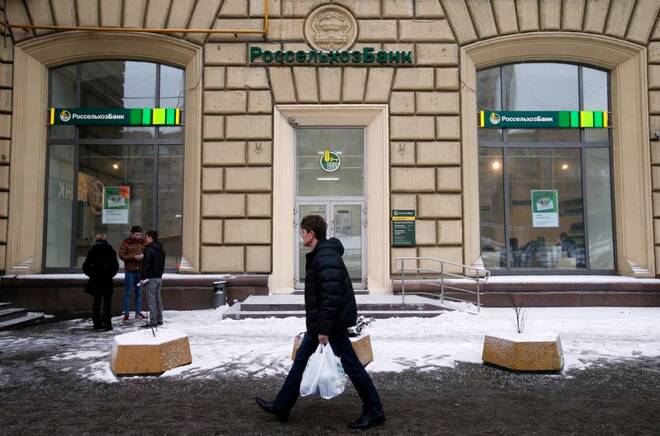Advertisement
Advertisement
Russia’s Rosselkhozbank says sanctions impeding efforts to honour debt obligations
By:
(Reuters) - State-owned Russian lender Rosselkhozbank said on Wednesday that British sanctions had prevented it from making a $21.25 million interest payment on Eurobonds maturing in 2023, the latest Russian company to flag debt servicing issues.
(Reuters) – State-owned Russian lender Rosselkhozbank said on Wednesday that British sanctions had prevented it from making a $21.25 million interest payment on Eurobonds maturing in 2023, the latest Russian company to flag debt servicing issues.
Unprecedented Western sanctions on Moscow for what it calls “a special military operation” in Ukraine have crippled Russia’s financial system and pushed the country to the brink of its first major default on foreign bonds since the 1917 Bolshevik revolution.
Citing UK sanctions, agricultural sector lender Rosselkhozbank said it did not pay $21.25 million worth of interest in favour of its Luxembourg-based subsidiary RSHB Capital S.A. under a subordinated loan agreement.
The payment on the $500 million Eurobond maturing in 2023 was due on April 16.
Rosselkhozbank said payment agent BNY Mellon in London had not confirmed that it was ready to accept the payment and make interest payments via clearing houses until it had received further instructions from British regulatory authorities.
BNY Mellon did not immediately reply to a Reuters request for comment.
“The bank confirms that it has sufficient liquidity to fulfil its obligations, including interest payments due on April 16, 2022, and is doing everything possible to service its debt,” Rosselkhozbank said.
The UK sanctions on Rosselkhozbank and Russian banks losing international credit ratings after Feb. 24 have clouded the lender’s outlook. But Russia’s ACRA rating agency still rates Rosselkhozbank at AA level with a stable forecast.
Rosselkhozbank regularly gets state support to continue lending to the country’s agriculture sector, which was boosted by Russia banning most imports from western nations in response to the imposition of sanctions against Moscow in 2014.
(Reporting by Reuters; Editing by Kim Coghill)
About the Author
Reuterscontributor
Reuters, the news and media division of Thomson Reuters, is the world’s largest international multimedia news provider reaching more than one billion people every day. Reuters provides trusted business, financial, national, and international news to professionals via Thomson Reuters desktops, the world's media organizations, and directly to consumers at Reuters.com and via Reuters TV. Learn more about Thomson Reuters products:
Did you find this article useful?
Latest news and analysis
Advertisement
